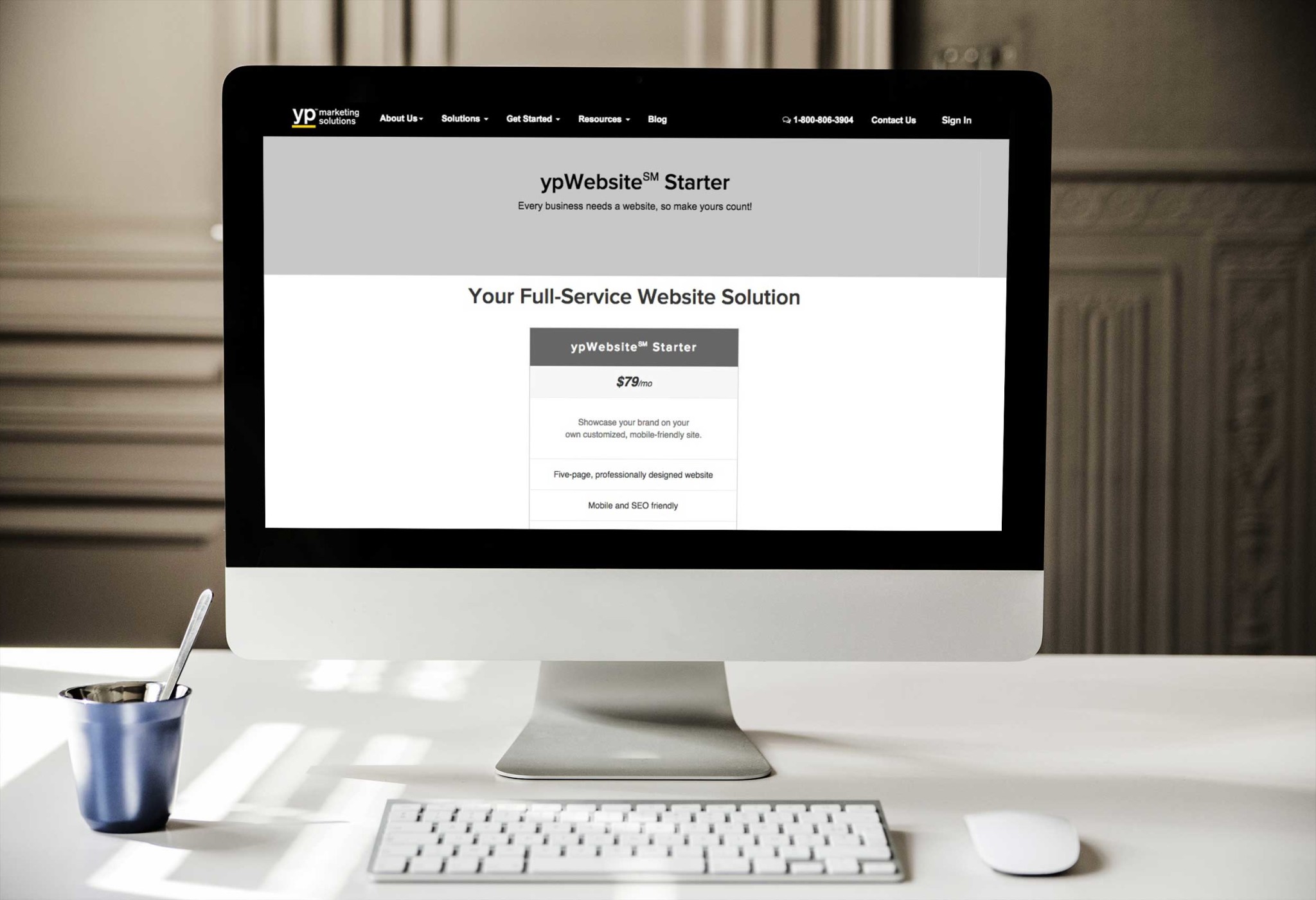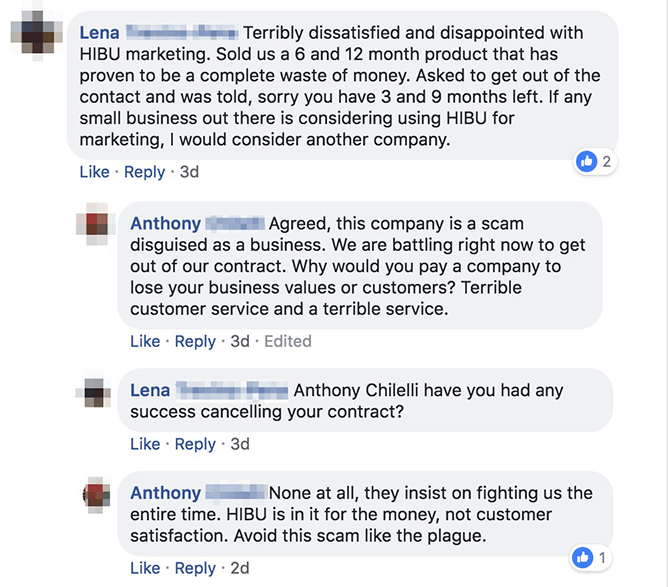The following is an opinion, backed by online research.
Many businesses have considered (or are using) services such as Hibu or YP (Yellow Pages) to build their websites. I get that sometimes, for those unfamiliar with online marketing, knowing where to host and build your website can be confusing. And, that’s what these services are counting on!
And, more often than not, I have had clients come to me who started out with one of these services and did not get the results they were promised or expected. These services like to use the guise of building you a website to upsell you on their other online marketing services, many of which are expensive and provide little ROI, according to some reviews online.
A Local Business Experience With YP (Yellow Pages) Websites
I recently received a phone call from a local HVAC company who had a bit of a conundrum. He ran a local business and had for years used the Yellow Pages for his advertising. Several years back one of their sales reps from YP, the online division of the company that produces the Yellow Pages, approached him about doing a website for him to promote his company. Being not all that tech savvy, he jumped at the chance to have a much needed online presence.
YP got this contractor all set up with his “shiny new website” and here’s where the problems begin to arise. He didn’t really have any control over it, and it didn’t have much potential for expansion or customization.
In fact, the whole process was fraught with problems from the beginning and he quickly grew frustrated with dealing with poor customer service and slick salespeople telling him all of his ideas for bettering his website would require an “upgrade” fee. He soon found his “bargain” website was not all that great of a deal after all.
He ran into many of the same issues that have plagued companies I have spoken to who opted to get a website from Hibu or YP.
Yellow Pages Are Past Their Prime
The Yellow Pages were great pre-internet when people used to “let their fingers do the walking” to find local businesses. But, as times have changed and more people now navigate to their computer to find local contractors, painters, electricians, lawn care services, doctors, restaurants, and many other businesses, the traditional printed Yellow Page books have become somewhat obsolete.
So, YP, in an effort to keep their business afloat, has expanded to offer online services. They now take both paid and non-paid listings from businesses, just like they did with the old phone books. And, just like they did with their non-paid phone book listings, they sell upgrades in their “directory” in the form of paid advertising.
Certainly, you can pay them for “higher” rankings within the YP directory, just as you paid for advertising in the old printed Yellow Pages, but they have also now gotten into the business of selling websites and web hosting to their advertisers.
When you purchase a website from them or Hibu, you are not actually paying for a “real” company website, but rather a single or multi-page template website that either coexists on the internet with your existing, actual website, or acts as your one and only website (although you never really own it). Many times that company will also purchase your domain name to use with that single page site, taking your own company name out of your hands.
Problems With Using Services Like Hibu or YP For Website Design
While their entry pricing and slick salespeople make their services sound like a great deal for a website for a small local business, it appears to be the hidden fees and underperformance, not to mention a lack of customer service after the sale, as reported by many online, that over time that will plague a business owner. Let’s discuss some of the pitfalls…
You Don’t Own Your Own Site
When you build your website with Hibu or YP you don’t own it, in the traditional sense of owning your own website. You are renting the use of it for as long as you remain under contract with them and pay for it. Unlike a traditional website that you own, after it’s built you can can’t easily move a website from these services to a new hosting company, nor can you grow past their capabilities.
Incidentally, this is also true of website builders that use proprietary software such as WIX, Weebly and SquareSpace.
Some services also copyright your pages to themselves! So, even if you could move it, you might run into copyright legality issues if you tried to duplicate your own website on another hosting platform.
They may tell you that you own the content, but, if this is the case, why are they copywriting it in their own name and not yours? All of my client’s website are copyrighted to their own business.
So, in effect, you are renting a web page/site from them, for your use as long as you keep paying them. This is in stark contrast to when you enter into a contract with a website development firm or web designer.
Generally, in a traditional website design and development contract, they are doing work for hire and you own the actual website they create, once you have paid them for their work. You are free to host it where you choose and move it from host to host (as long as it is built on a standard language or CMS management system such as WordPress, so it can be transferred easily).
Expensive Monthly Fees (Website Rental)
The biggest complaint I hear from clients about the websites from these services is the low “entry” fees, which quickly turn into high monthly fees they are paying for the website, as well as other services the companies convince them they need to add-on.
They charge very expensive monthly rates for very basic websites. YP’s starter rate (at the time this was published) is $80 a month for a basic 5-page site. And, from what people have told me, these prices are generally just the “starter” prices and they go up after a year.
Need more pages or customized design? Be prepared to pay hefty upgrade fees, which they don’t make as public as their first-year “teaser” rate.
At the time of this writing, a Hibu 4-page basic site is $147 a month. That equates to nearly $2000 per year!
I could build you a very nice basic 4-page website for less than those amounts. And, it would be search engine optimized and much easier for you to update! Most website designers charge a one-time fee to design and develop your site. After that, it’s yours to host wherever you want or do whatever you want with it.
One Hibu customer review online stated that:
They built my website and I was told it was to be $99 per month. Three months later I was being charged $300 per month. They told me that it was a 3-month introductory rate, however, they neglected to tell me this when they sold me the website. After this, I called and canceled. When I canceled, I was told that the account was paid in full and there was no outstanding debt. Today, I find out that they reported it to a collection agency and are threatening legal action over something that was paid in full.
Apparently, this isn’t just a problem with websites, but extends to other services too:
Hosting and Website Design Are Two Different Things
Honestly, these services “hosting” fees — $89 a month or $149 a month — are basically them just aggregating out the cost of the website build over time — an extremely long time.
A medium to large size 10-25 page website, with moderate local traffic expectations, should not run you any more than about $25 a month for premium hosting. The domain name renewal, which these services will throw in as a “freebie” is less than $20 a year.
Many people will choose this method of website creation over an actual website developer because they don’t have to pay an up-front fee for their website design. While that may sound like a better deal to some, I call it taking a “rent-to-own” attitude with your company’s marketing.
$99 a month seems more palatable than $1000 for a new custom built website. But, when you add in overall costs and value, you actually come out ahead investing in your own website, which should last you a good 2-3 years before it needs a refreshed designed, generally.
$80 a month, over the course of two years, is almost $2000. Over 3 years it is almost $3000. And you don’t:
- own your own site ;
- you don’t own your own domain name ;
- or get any ability to update the site yourself or do any customization work.
I offer a Turnkey program like that as well, however, the website is yours after the contractual time obligation is done and you are free to move it wherever you like. They don’t offer you that option. You are locked into their service (hosting) forever, at whatever price they dictate.
When you choose a real website developer you own the site when it is done and paid for, not the website designer. It’s yours forever, to do with as you wish. Keep in mind, many website developers and designers, myself included, take credit cards.
So, if you don’t have an initial outlay of $1000 to $2500 cash laying around for a new website, you can always charge it and split your payments into a monthly fee that suits you – and own your own website, or find a designer that offers a turnkey product like I do. For heaven’s sake, don’t rent it in perpetuity from a company like Hibu or YP! 😉
Your Website From These Services Competes With Your Actual Website
If you already have a website or are thinking you may build one in the future that you will have more control over, your templated, cookie-cutter website from YP (also known as your “not as nice” one) will then become your “competitor.”
While it may seem like a good idea to have two websites showing up in search, that is not necessarily a good thing for a number of reasons.
Over time, every website will eventually accumulate links from social media and other sites, or get saved to customer’s bookmarks as a favorite. These links and bookmarks contribute to your overall long-term SEO and improved customer experience.
Your older “ugly” website could end up stealing SEO from your real website and may not be portraying the “brand” you want to have for your business.
And, if you quit paying for or maintaining the expensive YP website, it will eventually fade into oblivion, along with all the SEO and bookmarks that it had built up.
Domain Names Held Hostage
Your domain name, which is usually the name of your business and very important to branding, is set up by YP, or similar services, entirely under their control. Client transfer is prohibited and YP retains total control as not only the administrator of the domain name, but also as the registrant.
I even heard the story of one local business who actually did own their own domain name, only to be told by such a service that they needed to transfer it to them, in order to set up their site. Basically, they stole his domain from him!
When they do this, it means should you want to use your domain name with a new website in the future you would have a long and hard fought battle to get it released from the control of the other company.
I have heard stories of some people successfully getting their own domain names released, but generally not without a huge price tag to do so. Most stories I have heard from people is it was impossible for them to get their own domains back after being set up by YP for a website.
One thing I always stress to my clients is maintain control of your own domain name, no matter who is building your website. You can let your web designer have access to setup your nameservers, etc., but make sure that domain is registered in your name, with your current contact info, not someone else’s.
And, also be sure you are renewing your domain name every year. If you are afraid of forgetting, set it up to auto-renew on your behalf and don’t let it lapse due to outdated credit card info, etc.
Rebuilding a website if need be is doable, but trying to get back your own domain name, when you didn’t register it in your own name initially, is extremely difficult. Having control of your own domain is a must at all times!
If someone else is registering your domain name for you, say a website developer or third party, make sure it has your contact information as the domain name owner. Generally domains I register have the client as the owner with me as the technical contact person.
Cookie-Cutter Designs
Websites created by Hibu and YP are pretty much all the same at their basic level. The client’s website is put online with a generic or semi-generic template that looks like hundreds of other websites in their own industry.
They may offer a handful of templates for each industry – painting, hair salons, contractors, electricians, doctors, etc. Then, they charge a crazy amount of money per month, for the same website your competitor down the street from you may also have. There is no personal branding involved at all, aside from minor color, copy and image changes.
One industry professional did some research on around 1000 websites tagged with “web design by YP” and discovered approximately 65% of the websites used a single template, 20% used a different template, 10% used a third and 5% were a mixture of the three templates above. The main differences between the sites in each template were the colors and images used. Information was all in the same place and the HTML code was all very similar.
If you want a more personalized look or feel, they start up-charging your monthly fee to get it. In the end, you still pay stupid high monthly fees for a cookie cutter website that you can’t do much with.
Poor Search Engine Optimization
Many people who tried these services that I have spoken with complain of poor visibility in search and are perplexed by how this can be. It’s the “Yellow Pages,” after all? Surely they are built for search? Right? Well, not necessarily, and not usually.
You may be able to get great visibility within the search result if someone clicks on the actual YP link since you are paying for higher placement in their directory. But, this doesn’t help you with organic Google and Bing searches at all. You are relying on a person searching for your business to actually click through to the YP link in their directory, which 9 times out of 10 they won’t bother to do.
This isn’t uncommon for YP websites. YP doesn’t have a “special relationship” with Google, any more than anyone else does, so anyone telling you they have some secret “agreement” with search engines to make you rank higher is full of it.
When you use a service like this, which specializes in cookie-cutter, you also don’t have expertise in writing web pages that are SEO friendly. You aren’t getting any customized copywriting for your site by a true web professional who knows what search engines are looking for to rank sites.
The requirements for good SEO with Google are constantly changing, they are pumping out thousands of websites. Do you really think they are going to go back and update each and every one to comply with the next major Google search update?
In the search of 1000 YP websites mentioned above, most pages on the websites had less than 300 words per page, with quite a few having less than 100 words. Content is king for SEO, and thin, poorly written content is not doing you any favors. It is hurting you. This explains why YP websites rank so poorly in natural search engine results.
Being found online and top in search results takes a lot of work and simply leaving it up to YP to “place” you in search is not a good marketing strategy or use of your advertising dollars. There is no magic bullet to make you land in those top results.
Good SEO practices include a combination of things like excellent content that people in your area are searching for, keeping your website refreshed and updated, making sure you are listed in many local directories, not just YP, and tons of other factors.
Poor Content Management
Most people with a YP website put their information up once and just kind of leave it there to sit for years on end. This is not the proper way to manage a website. Content that is not updated and refreshed will cause your website to lose ranking and does not give your clients or customers a reason to come back to your site.
Even worse, I have read stories will a YP rep will tell a potential client that they research your competitors websites for keywords, etc., but in some instances they are actually copying competitors wording, which is a huge no-no, and, on top of copyright issues, causes duplicate content issues which will make your website suffer in search.
You should be working hand-in-hand with your website developer to make sure you are pumping out keyword rich copy personalized for your business and your location.
The most successful websites are constantly refreshing their content through original copywriting and blogging, adding galleries of pictures for recent jobs, interacting with their customers and clients online via forums and commenting on blog posts. They also cross promote posts and pages on social media sites like Twitter, Instagram, and Facebook.
Successful website owners also watch their Google Analytics and have a finger on the pulse of what people are searching for in their industry, so they can constantly refresh their keywords on pages.
YP Advertising vs YP Website Design
I am by no means saying that directories like YP may not have a place in your online marketing budget. Certainly, many people have reported excellent results by paying to make themselves rank higher in their directories, as well as other online directories.
You need to differentiate between the directory advertising arm of their business and relying on them to build you an actual website.
This article is, of course, my opinion based on phone calls I have fielded and people I have spoken to who have used their services in the past, as well as reading reviews left by customers of them online.
Just be sure you thoroughly research YP or Hibu before entering into a website design contract with them. Here is a link to ConsumerAffairs.com to get you started.
You may find that having YP or Hibu build your company website may not be your best deal in the end. They seem to rely more on slick sales reps to push their products and up-sells, for higher prices, instead of professional website developers and SEO specialists – the people who study this day in and day out and who know how to really maximize your online presence for long-term results.
- How a Boutique Web Design Agency Offers More Personalized Service - June 23, 2025
- When Should You Redesign Your Website? 7 Warning Signs - June 20, 2025
- We’re Honored: Named One of the Best Web Design Blogs in Florida by FeedSpot - June 10, 2025






